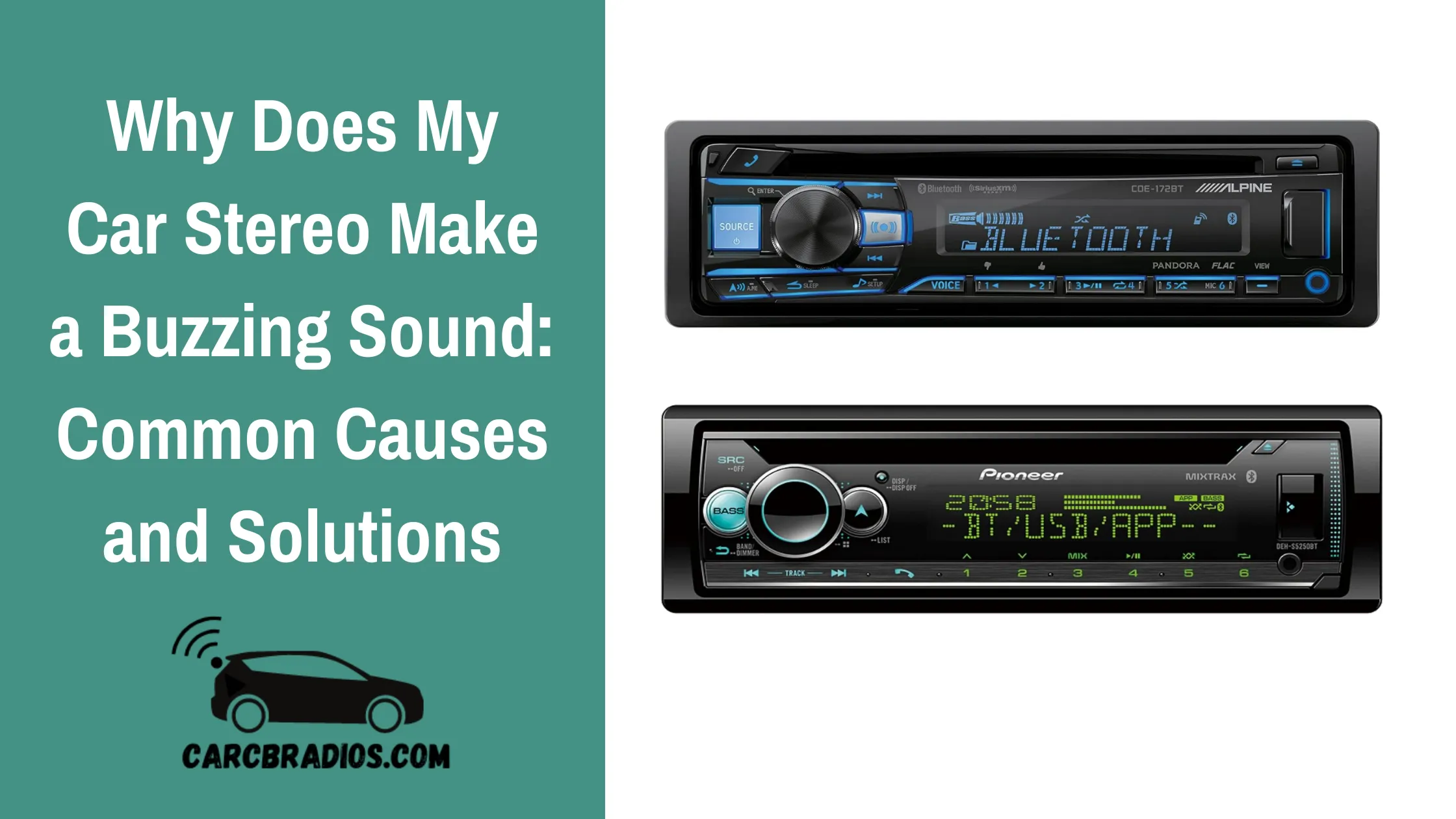By: Jeremy Neisser
As a car owner, I rely on my car radio for entertainment and information while on the road. However, sometimes issues can arise, and my car radio may emit a buzzing sound that can be quite annoying. In this article, I will explore the possible reasons why my car stereo is making a buzzing sound, whether aftermarket car audio is better than factory car audio, and the history of car radios.
Car radios have come a long way since their inception, and they are now more complex than ever before. As a result, diagnosing and correcting issues with car radios can be challenging. In this article, I will provide possible reasons and remedies for a buzzing sound in car stereos and compare aftermarket car audio to factory car audio. Additionally, I will delve into the history of car radios to understand how they have evolved over the years.
Key Takeaways
Car radios have evolved from a device only providing audio entertainment to a feature-laden necessity, but issues can arise occasionally.
Aftermarket car audio may offer better sound quality and customization options, but factory car audio is often more reliable.
Buzzing sounds can be created based on three typical reasons; loose wires, bad ground or ground loop noise, and electromagnetic interference
Why Does My Car Stereo Make a Buzzing Sound?
As a car owner, it's frustrating to hear a buzzing sound coming from your car stereo system. It can be distracting and ruin your listening experience. There are a couple of common reasons why your car audio system is making a buzzing sound.
One of the most common causes of buzzing sound is damaged speaker cones. Speaker cones are delicate and can rip or tear with use and age. If you notice any rips or tears on the speaker cones, you will need to replace the affected speakers. To inspect the speakers, you can remove the metal sheath covering that protects the speakers and run your fingers over the speaker cones.
Another common cause of buzzing sound is a malfunctioning head unit. The head unit is the primary audio source that sends sound to your speakers and can cause buzzing sounds if it is malfunctioning. To test this, you can disconnect your current head unit and connect an alternate one in its place. If the alternate one doesn't produce the buzzing sound, you will need to swap your head unit with a factory or aftermarket replacement.
If you have inspected the speakers and the head unit, but the buzzing continues, it could be the internal components of your speakers leading to your speakers needing to be replaced. Other less likely causes could be a poor connection to your phone or smart device, damaged wiring from the head unit to your speakers, etc.
In conclusion, buzzing sound from your car stereo system can be annoying and distracting. Inspecting the speakers and the head unit can help you identify the cause of the problem. If you are unable to identify the cause of the buzzing sound, it is recommended to seek professional help.
Aftermarket Car Audio vs. Factory Car Audio
As an audio enthusiast, I understand the appeal of having a personalized aftermarket car audio setup. However, the gap between aftermarket and factory car audio has significantly narrowed in recent years.
Factory car audio has improved drastically with partnerships with big-name audio companies like Bang & Olufsen, Bose, Harmon Kardon, Infinity, Mark Levinson, Meridian, and Bowers & Wilkins. These partnerships have led to advanced features like Bluetooth connectivity, larger touch screens, Apple CarPlay and Android Auto integration, SiriusXM, and wireless streaming, which are now standard in many newer vehicles.
While aftermarket car audio still offers a cleaner sound, more wattage, and expanded options, factory car audio has made significant strides in catching up. Additionally, factory car audio is often more reliable and better integrated with the car's overall system.
Overall, if car audio is an important feature for you when searching for your next new car, it is worth considering the factory options available. However, if you are an audio enthusiast who demands a personalized setup, aftermarket car audio is still a viable option.
Possible Reasons & Remedies
Loose Wire Connections
Loose wire connections can cause a high pitched noise in audio systems. To remedy this issue, I would recommend checking all wire connections and ensuring that they are properly secured. It may also be helpful to use a multimeter to test the connections and make sure that they are providing the correct voltage.
Ground Loop Noise
Ground loop noise is a common issue that can cause interference in audio systems. To remedy this issue, I would recommend using a ground loop isolator. This device can help to eliminate the noise by isolating the ground connections between the audio components.
Electromagnetic Interference
Electromagnetic interference can also cause a high pitched noise in audio systems. To remedy this issue, I would recommend using shielded cables and keeping the audio components away from any sources of electromagnetic interference, such as power transformers or fluorescent lights. It may also be helpful to use ferrite cores on the cables to reduce interference.
Frequently Asked Questions
How to Fix the Buzzing Sound in My Car Stereo?
If you are experiencing a buzzing sound in your car stereo, there are several steps you can take to fix it. First, check all the connections to ensure they are secure and properly grounded. If that doesn't work, try adjusting the volume and tone controls to see if that makes a difference. You can also try using an inline noise filter or upgrading your car stereo system.
What Causes a Car Stereo to Make a Buzzing Sound?
There are several factors that can cause a car stereo to make a buzzing sound. One common cause is poor grounding, which can create interference and noise in the audio signal. Other causes include a damaged or faulty amplifier, loose connections, or interference from other electronic devices in the car.
Is an Inline Noise Filter Necessary for Car Audio?
An inline noise filter can be helpful in reducing unwanted noise and interference in your car audio system. However, it may not always be necessary, especially if you have a high-quality car stereo system that is properly installed and grounded.
Why Do Car Speakers Make Static Noise When the Radio is Off?
If your car speakers are making static noise when the radio is off, it could be due to interference from other electronic devices in the car. This can include the alternator, ignition system, or other electrical components. Installing an inline noise filter or upgrading your car stereo system can help reduce this interference.
Can an Alternator Noise Filter Fix a Buzzing Sound in My Car?
An alternator noise filter can be effective in reducing unwanted noise and interference in your car audio system. However, it may not always be the solution for a buzzing sound in your car stereo. It's important to diagnose the issue properly to determine the best course of action.
What Can Cause Car Radio Interference When the Engine is Running?
Car radio interference when the engine is running can be caused by a variety of factors, including poor grounding, interference from other electronic devices, or a damaged or faulty amplifier. It's important to properly diagnose the issue to determine the best solution.

Hi & Welcome!
My name is Jeremy and I have been an avid car nut for many year. My first car was an 1987 Honda CRX. I put in my first Kenwood stereo, amp, 2 10" JLs and a CB Radio in it and have been an avid user of CBs and car radios for years. I'll do my best to share my tips, information and thoughts to help you with whatever question you might have, ABOUT ME
After I graduated from High School, I worked 5 years are Radio Shack and 3 years at Circuit City answering questions and helping customers with various electronics questions.


